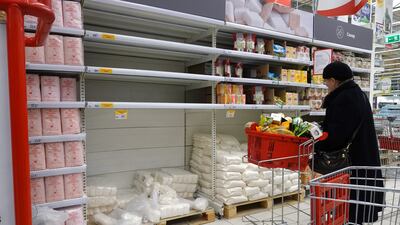Live updates: follow the latest news on Russia-Ukraine
The UN downgraded its forecast for global economic growth for 2022 to 2.5 per cent from 3.5 per cent as the Russia-Ukraine war worsens growth prospects, weakens the rebound from the Covid-19 pandemic and deepens uneven recovery.
Russia will fall into a deep recession this year, while significant slowdowns in growth are expected in parts of Western Europe and Central, South and South-East Asia, the UN Conference on Trade and Development (Unctad) said in a report on Thursday.
Long-standing structural problems, new geopolitical risks and tighter monetary policies are set to stymie growth across developing economies, it said. This will not only hurt their fragile recovery but also undermine their long-term development, it added.
“The economic effects of the Ukraine war will compound the continuing economic slowdown globally and weaken the recovery from the Covid-19 pandemic,” said Rebeca Grynspan, secretary general of Unctad.
“Many developing countries have struggled to gain economic traction coming out of the Covid-19 recession and are now facing strong headwinds from the war. Whether this leads to unrest or not, a profound social anxiety is already spreading.”
The Russian military offensive in Ukraine entering its second month has led to higher oil prices, which has added to inflationary pressures on the global economy and raised the price of food and commodities. The International Monetary Fund and other organisations have said the conflict will dent global growth this year, increase poverty and disrupt supply chains.
Soaring food and fuel prices will have an immediate effect on the most vulnerable in developing countries, resulting in hunger and hardship for households who spend the highest share of their income on food, Unctad said.
“The danger for many of the developing countries that are heavily reliant on food and fuel imports is more profound as higher prices threaten livelihoods, discourage investment and raise the spectre of widening trade deficits.”
The war in Ukraine has also caused immediate disruptions to global trade and is likely to have longer-term effects on its structure, Unctad said.
In the short-term, higher prices and supply scarcity are spilling over on to economies more dependent on Ukrainian and Russian exports, especially of commodities, including oil, minerals and food.
The UN body raised concerns about uncertainties stemming from the conflict in key international markets: an environment of volatile capital flows, exchange rate instability and rising borrowing costs, particularly for the least developed and middle-income developing countries, with the risk of serious external debt payment difficulties.
To protect the global economy, Unctad made several policy recommendations, including greater and less conditional financial support for developing countries, to help them deal with financial and economic shocks and increase investment to stimulate economic growth.
There is also a need for immediate debt relief for Ukraine along with renewed discussions on ways to restructure the developing country's sovereign debt during periods of severe financial stress.
It also called for sector-specific policies, including price controls and subsidies, to tackle pressures on inflation.
“The global economy is, literally and metaphorically, staring down the barrel of a gun. Stopping the war in Ukraine, rebuilding its economy and delivering a lasting peace settlement must be the priorities,” the report said.
“But the international community will also need to deal with the widespread economic damage that the conflict is already causing in many parts of the developing world; damage that will only intensify as the conflict persists.”


